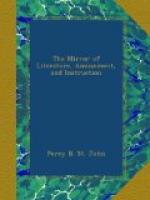All travellers agree that it is impossible to describe the effect produced by the colossal remains of this ancient capital; nor does it lie within our plan to attempt this description at present any farther than is necessary to make our readers acquainted with the general character and localities of the existing temples of Egypt.
No knowledge of antiquity, no long-cherished associations, no searching after something to admire, is necessary here. The wonders of Thebes rise before the astonished spectator like the creations of some superior power. “It appeared to me,” says Belzoni, “like entering a city of giants, who, after a long conflict, were all destroyed, leaving the ruins of their various temples as the only proofs of their former existence.” Denon’s description of the first view of Thebes by the French army, which he accompanied in the expedition into Upper Egypt, is singularly characteristic. “On turning the point of a chain of mountains which forms a kind of promontory, we saw all at once ancient Thebes in its full extent—that Thebes whose magnitude has been pictured to us by a single word in Homer, hundred-gated, a poetical and unmeaning expression which has been so confidently repeated ever since. This city, described in a few pages dictated to Herodotus by Egyptian priests, which succeeding authors have copied—renowned for numerous kings, who, through their wisdom, have been elevated to the rank of gods; for laws which have been revered without being known; for sciences which have been confided to proud and mysterious inscriptions, wise and earliest monuments of the arts which time has respected;—this sanctuary, abandoned, desolated through barbarism, and surrendered to the desert from which it was won; this city, shrouded in the veil of mystery by which even colossi are magnified: this remote city, which imagination has only caught a glimpse of through the darkness of time,—was still so gigantic an apparition, that at the site of its scattered ruins, the army halted of its own accord, and the soldiers, with one spontaneous movement, clapped their hands.” It is, however, rather unfortunate for Denon’s description, that another traveller denies that there is such an approach to Thebes as is mentioned in the extract, and he assures us that the ruins cannot be seen till the traveller comes near them; and further, that to produce such astonishing effects as the Frenchman describes, we ought to be very near them or among them. Without pretending to reconcile these contradictions, we can readily believe that the ruins may produce a considerable effect, even at some distance, if Denon’s drawings are at all correct. As to the impression made by a near inspection of these wonderful remains, there is no discrepancy among travellers.




